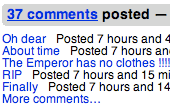1. Facebook sees monthly dip in UK traffic, not a big deal
2. Abengoa Solar wins solar electricity plant contract with Arizona government
3. NAND flash memory chips getting cheaper
4. Facebook developer Blake Commagere has top Facebook games
5. ILike, the social networking music application, now has 22 million users
6. Windows Live SkyDrive offers up to 5GB free storage
7. Ta-da, the magical wireless mystery tour: SF bus begins testing internet service
8. “A truly great idea: 99 cent rotating movie rentals on iTunes”
 Facebook sees monthly dip in UK traffic, not a big deal — Facebook had only 8.5 millions United Kingdom users in January, a drop of 400,000 monthly active UK users from December, a Nielson reports says. The Register crudely seizes on the news to suggest that the seasonal traffic dip is “very bad news for Facebook” — prompting a chorus of trollish comments (pictured). However, monthly fluctuations in social networking traffic are the norm. In fact, people were questioning the growth potential of Facebook back in 2006 due to drooping February, 2006 comScore stats (our coverage). That was before the site more than doubled in size. Another likely explanation for slowing Facebook growth statistics in the UK — and the US — is simply that most potential Facebook users in these countries have already joined (which we’ve mentioned, here).
Facebook sees monthly dip in UK traffic, not a big deal — Facebook had only 8.5 millions United Kingdom users in January, a drop of 400,000 monthly active UK users from December, a Nielson reports says. The Register crudely seizes on the news to suggest that the seasonal traffic dip is “very bad news for Facebook” — prompting a chorus of trollish comments (pictured). However, monthly fluctuations in social networking traffic are the norm. In fact, people were questioning the growth potential of Facebook back in 2006 due to drooping February, 2006 comScore stats (our coverage). That was before the site more than doubled in size. Another likely explanation for slowing Facebook growth statistics in the UK — and the US — is simply that most potential Facebook users in these countries have already joined (which we’ve mentioned, here).
Abengoa Solar wins solar electricity plant contract with Arizona government — The publicly-traded Spanish company, which already has plants in Spain, Morocco and Algeria, will build, own and operate a 280MW solar plant located near sunny Gila Bend, Arizona. The client, the Arizona Public Service Co., will pay $4 billion over the next 30 years. Operations will begin in 2011. Meanwhile, most US solar projects are still generating power in the 5-10MW range. From Clean Edge:
The Solana Generating Station will have a total capacity of 280 megawatts, enough to power 70,000 homes while avoiding over 400,000 tons of greenhouse gases that would otherwise contribute to global warming and climate change. The plant will employ a proprietary Concentrating Solar Power (CSP) trough technology developed by Abengoa Solar, and will cover a surface of around 1,900 acres.
NAND flash memory chips getting cheaper — Consumers might buy fewer new phones and other devices that contain NAND flash chips to save money during a recession. Demand will drop and the market will get oversupplied. Chips will get cheaper, and annual revenue from chip manufacturers will climb from seven to nine percent, research firm iSuppli says, a sharp drop from its earlier projections of a 27 percent increase. PC World takes a look at the numbers.
Facebook developer Blake Commagere, has the most top games on Facebook — So says this table crunched by Bret Terrill, of social game development company Tenuki, below. Here’s our interview with Commagere from last fall, about Open Social.
AI Weekly
The must-read newsletter for AI and Big Data industry written by Khari Johnson, Kyle Wiggers, and Seth Colaner.
Included with VentureBeat Insider and VentureBeat VIP memberships.
ILike, the social networking music application, now has 22 million users — ILike offers a range of Facebook applications, an iTunes toolbar, and a free-standing web site for musicians and their friends. Its main Facebook application has grown from 4.5 million total users last July to 14 million today. The other chunk of half of its total 22 million users are coming from iLike.com and social networks besides Facebook. Techcrunch has more.
Windows Live SkyDrive offers up to 5GB free storage — That’s equal to AOL’s Xdrive. Details here.
Ta-da, the magical wireless mystery tour: SF bus begins testing internet service — All you’ll see on the outside of this hybrid electric bus is black and green paint, with a picture of Mother Earth and an electronic display featuring environmentally friendly messages. Here’s what you’ll find inside, according to the Chronicle:
A big, black steel cabinet behind the driver’s seat is stuffed with gadgetry that allows laptop-toting riders to connect to the Internet. The onboard electronics also provide the wall-mounted touch screens with information on the bus’ route and location, connecting routes and live information on arrival times. It also collects information about the bus and its operation that will help Muni maintain, schedule and run buses more efficiently.
The bus, part of the San Francisco MUNI mass transit system, will start service on Monday and continue for the next year, running on the 10-Townsend line.
“A truly great idea: 99 cent rotating movie rentals on iTunes” — VentureBeat’s MG Siegler takes a look, on his personal blog, Parislemon.com.
VentureBeat's mission is to be a digital town square for technical decision-makers to gain knowledge about transformative enterprise technology and transact. Learn More
